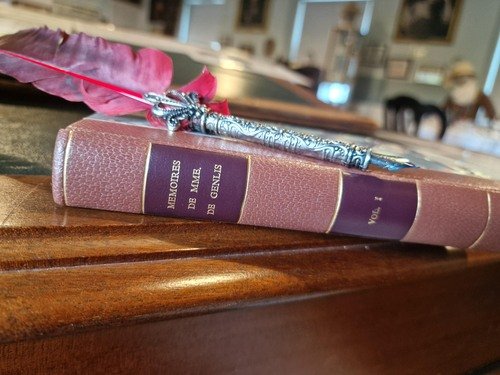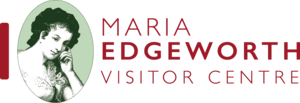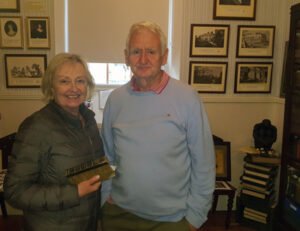Edgeworth, Madame de Genlis and Lord Edward Fitzgerald: A Web of Revolutionary Ideas
A Remarkable Gift Sparks a Historical Connection
On Thursday 21st August, the Centre received an unexpected and remarkable gift. Éamon de Búrca of De Búrca Rare Books donated a rare eight-volume set of the Memoirs of Madame la Comtesse de Genlis. Even more extraordinary, each volume bears the personal signature of Maria Edgeworth.
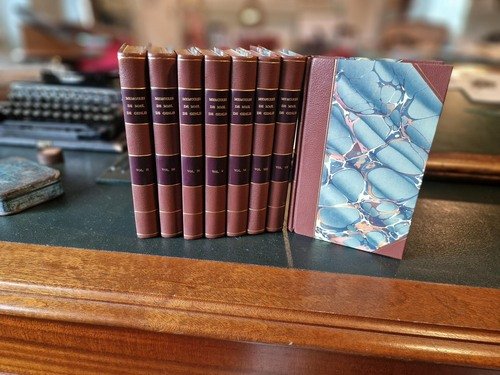
This donation does more than add to a rare book collection. It highlights a fascinating historical connection between Edgeworth and Madame de Genlis. It also opens a window into a broader world of literature, education and revolutionary thought that spanned Ireland and France in the late eighteenth and early nineteenth centuries. To understand why these figures matter, we need to explore how Edgeworth, Madame de Genlis and Lord Edward Fitzgerald were linked by ideas, family ties and history.
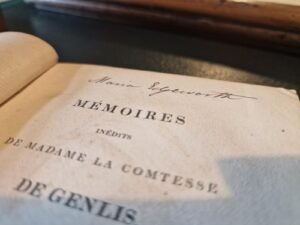
Ideas on the Move in Europe
In the early 1800s, ideas moved quickly across Europe. Writers, thinkers and revolutionaries inspired one another through books, letters and personal meetings. One such exchange took place in Paris in 1803. Maria Edgeworth — the well-known Irish novelist and educationalist — met Madame la Comtesse de Genlis.
Who Was Madame de Genlis?
Madame de Genlis, born Stéphanie Félicité du Crest in 1746, was one of France’s most prolific writers and educators. She served as governess to the children of the Duke of Orléans and became famous for her innovative methods of teaching. Her works included novels, plays and educational treatises, many of which promoted moral development and hands-on learning.
Her most famous book, Adèle et Théodore, argued that education should develop both character and intellect. De Genlis’s writings were widely read across Europe and admired by figures such as Maria Edgeworth. Despite the upheavals of the French Revolution, she remained an active voice in debates on citizenship, morality and the role of women in society.
Maria Edgeworth and Madame de Genlis
When Edgeworth met Madame de Genlis in Paris, the two women discussed literature, pedagogy and social reform. Edgeworth admired de Genlis’s practical and modern ideas about education, which resonated with her own work, such as Practical Education. Their meeting reflects the intellectual networks that crossed borders and shaped cultural debates during this period.
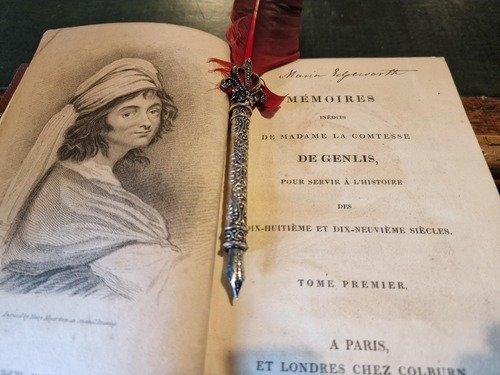
An Unexpected Link to Ireland’s Revolutionary Hero
Madame de Genlis also connects directly with one of Ireland’s most celebrated revolutionaries. She was the mother of Pamela, who would later marry Lord Edward Fitzgerald.
Lord Edward Fitzgerald’s Early Life and Travels
Lord Edward Fitzgerald was born in 1763 into the influential Leinster family. His childhood was spent between Carton House in County Kildare and Leinster House in Dublin. As a young man, he joined the British Army and served in North America during the War of Independence. These experiences exposed him to republican and democratic ideals that would later shape his political vision.
Marriage and Enlightenment Influence
Later, Fitzgerald lived for a time in France, where he met and married Pamela, the daughter of Madame de Genlis. This marriage placed him in the heart of Enlightenment-era circles, where ideas about liberty, equality and citizenship were passionately debated. When the couple returned to Ireland, they divided their time between Kildare and Dublin.
The Irish Rebellion and Fitzgerald’s Legacy
Inspired by the American and French revolutions, Fitzgerald became an active member of the Society of United Irishmen. His goal was to create an independent Ireland united across religious lines. In 1798, his role in planning an uprising made him a target for arrest. He was captured in Dublin after a violent struggle and fatally wounded. Lord Edward died in prison at the age of 34, becoming one of Ireland’s most romantic and tragic revolutionary heroes.
Literature, Education and Revolution Intertwined
The lives of Edgeworth, Madame de Genlis and Lord Edward Fitzgerald illustrate how literature, education and politics often overlapped in this era. Through books, ideas and personal relationships, these figures helped shape debates on freedom, morality and social progress. Their intertwined stories remind us that cultural and political change often move hand in hand across borders.
